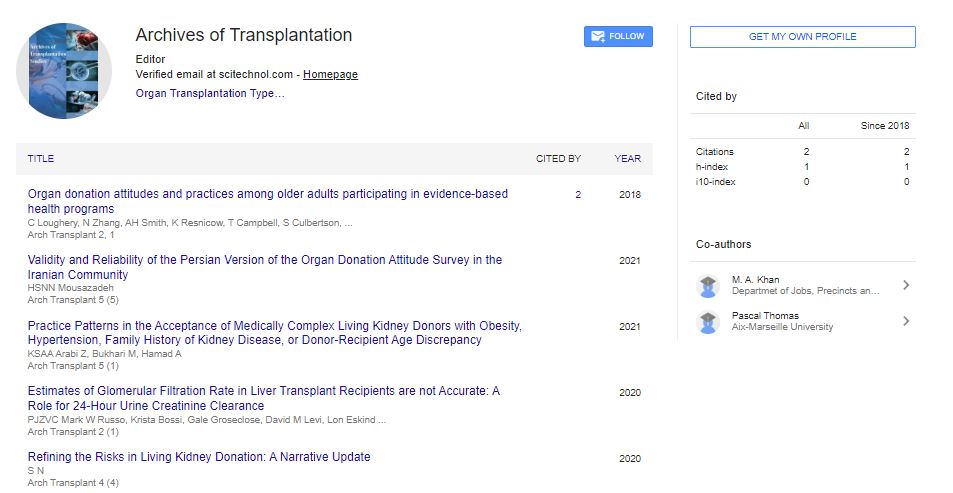Commentary, Arch Transplant Vol: 7 Issue: 4
Examining Transplant Immunology Techniques and Their Applications in Human Health
Christine Greinner*
1 Department of Medicine, Washington University School of Medicine, Missouri, United States of America
*Corresponding Author: Christine Greinner,
Department of Medicine,
Washington University School of Medicine, Missouri, United States of America
E-mail: Christine_greinner@wusm22.edu
Received date: 22 November, 2023, Manuscript No. AT-24-124977;
Editor assigned date: 24 November, 2023, PreQC No AT-24-124977 (PQ);
Reviewed date: 11 December, 2023, QC No. AT-24-124977;
Revised date: 19 December, 2023, Manuscript No. AT-24-124977 (R);
Published date: 26 December, 2023, DOI: 10.4172/AT.1000156
Citation: Greinner C (2023) Examining Transplant Immunology Techniques and their Applications in Human Health. Arch Transplant 7:4.
h2>Description
Transplantation has emerged as a life-saving intervention for individuals suffering from organ failure, but its success hinges on understanding and mastering the complexities of transplant immunology. It delves into the techniques employed in transplant immunology and explores their vital applications in safeguarding human health. Transplant immunology is the study of the body's immune response to transplanted organs or tissues. The immune system, designed to protect the body from foreign invaders, poses a significant challenge to the acceptance of transplanted material. To overcome this hurdle, experts and medical professionals employ a range of sophisticated techniques.
One fundamental aspect of transplant immunology is ensuring compatibility between the donor and recipient tissues. Histocompatibility testing involves analyzing Human Leukocyte Antigens (HLA) to assess the likelihood of graft acceptance. This technique minimizes the risk of rejection and is vital for successful transplantation. To prevent the immune system from attacking the transplanted organ, immunosuppressive drugs are administered. These medications, such as cyclosporine and tacrolimus, suppress the activity of T cells and other immune components. While essential for preventing rejection, a delicate balance must be maintained to avoid compromising the overall immune defense against infections.
Tolerance induction aims to reprogram the immune system to accept the transplanted organ as "self." Innovative techniques, including cellular therapies and regulatory T cell modulation, are being explored to induce a state of tolerance without the need for longterm immunosuppression. This could revolutionize transplant medicine, reducing the risks associated with chronic immunosuppressive drug use. The impact of transplant immunology on human health is most evident in the success of organ transplantation. Heart, kidney, liver, and lung transplants have become established procedures, providing a lifeline to individuals facing organ failure. Advances in histocompatibility testing and immunosuppressive regimens have significantly elevated the success rates of these lifesaving interventions.
Transplant immunology extends its impact to the treatment of hematological disorders through bone marrow and stem cell transplants. Matching donor and recipient tissue types is essential to minimize the risk of graft-versus -host disease, showcasing the broad applicability of these techniques beyond solid organ transplants. The most direct application of transplant immunology techniques is in organ transplantation. Heart, kidney, liver, and lung transplants have become routine medical procedures, providing a new lease on life for patients facing organ failure. The meticulous application of histocompatibility testing and immunosuppressive regimens has significantly improved the success rates of these procedures.
Beyond solid organ transplants, transplant immunology plays a pivotal role in bone marrow and stem cell transplants. These procedures are employed in the treatment of various hematological disorders, such as leukemia and lymphoma. Matching donor and recipient tissue types is essential to minimize the risk of graft-versushost disease, a potentially life-threatening complication. Transplant immunology is also making strides in the field of diabetes. Islet cell transplantation, where insulin-producing cells are transplanted into diabetic patients, holds potential for improving glucose control. However, challenges remain in achieving long-term graft survival without the need for immunosuppression.
Advancements in transplant immunology have paved the way for innovative procedures like face and hand transplants. These complex surgeries involve connecting nerves, blood vessels, and tissues, requiring precise immunological considerations to minimize rejection and optimize functional outcomes. While transplant immunology has undoubtedly transformed healthcare, challenges persist. Rejection, infections, and the long-term consequences of immunosuppressive therapies are ongoing concerns. Experts are actively exploring new avenues, such as personalized medicine approaches and gene editing techniques, to enhance the precision and safety of transplant procedures.
Conclusion
In the realm of healthcare, transplant immunology stands as a beacon of hope, providing solutions to individuals facing life-threatening conditions. The techniques employed in this field continue to evolve, contributing to the success and safety of transplant procedures. As science progresses, the day may come when the term "transplant rejection" becomes a relic of the past, and the full potential of transplant immunology is realized in its quest to improve and save countless lives.
 Spanish
Spanish  Chinese
Chinese  Russian
Russian  German
German  French
French  Japanese
Japanese  Portuguese
Portuguese  Hindi
Hindi 